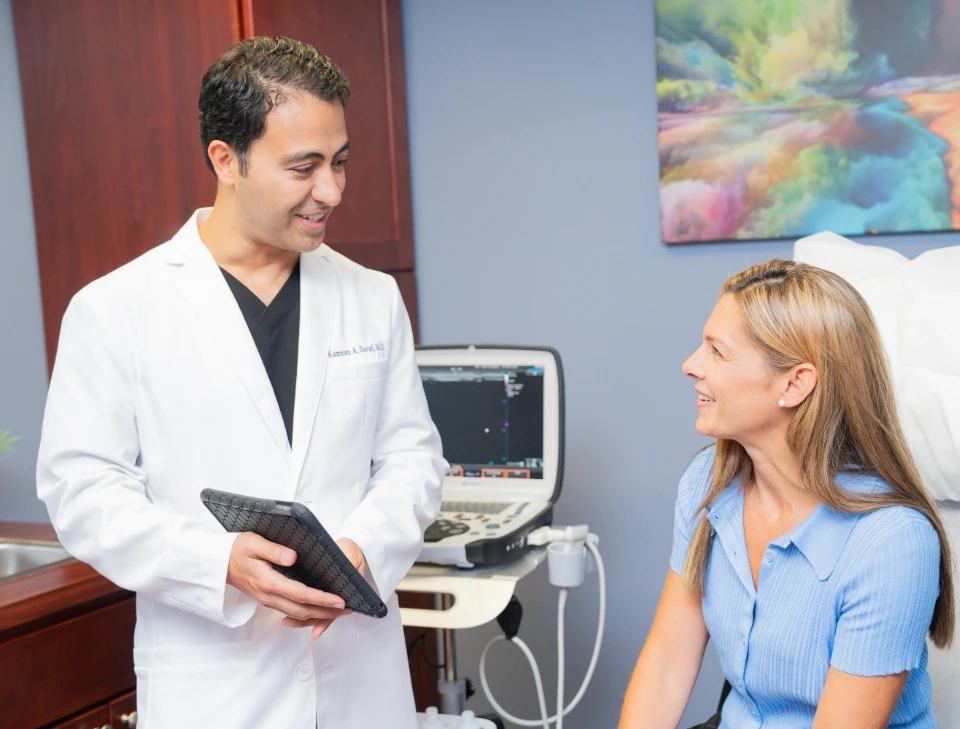What causes spider veins during pregnancy?
If you’re pregnant, you may have noticed dense clusters of web-like veins on your skin’s surface. You might notice these unhealthy veins in your upper thighs, hips, calves, legs, or even your face — these unhealthy veins are called spider veins. If you have spider veins during pregnancy, you might wonder if you should be concerned or seek treatment. If you want to understand what causes spider veins during pregnancy, you must understand spider veins and vascular health in general.

The human body contains two types of blood vessels — arteries and veins. The arteries carry oxygenated blood from the heart to different parts of the body, and the veins carry deoxygenated blood from various parts of your body to the heart. The veins contain vein valves that act as one-way doors, ensuring blood only flows towards the heart — and not backward due to gravity. When the vein valves collapse or malfunction, gravity forces blood to flow backward and accumulate in the leg veins.
This condition is known as chronic venous insufficiency, and it’s the root cause of spider veins during pregnancy. When you suffer from chronic venous insufficiency, blood continues accumulating in your leg veins. Over time, the continued accumulation of blood in leg veins leads to vascular dilation and the eventual formation of spider veins and varicose veins on the skin’s surface. As such, spider veins occur because of collapsed vein valves and gravity.

So, what’s the link between spider veins and pregnancy?
Well, pregnancy is one of the leading risk factors for spider veins and chronic venous insufficiency. During pregnancy, your body undergoes numerous changes that weaken the vein valves and increase the risk of vein disease. The total volume of blood in your body increases, your body produces a higher volume of estrogen and progesterone, and the fetus applies increased pressure on your veins. Because of higher estrogen and progesterone levels, the vein valves weaken or become floppy, and the increased pressure leads to a collapse.
When the vein valves collapse, blood flows backward due to gravity and accumulates in the leg veins, eventually leading to spider veins. That’s why you get spider veins during pregnancy.
What do spider veins look like?
Spider veins look like dense clusters of reddish or bluish spider webs that spread outwards from a central location on your legs. People often describe them as spider webs or the thin legs of spiders. They usually appear on the lower extremities of the body and the face, but they can technically appear anywhere on the body. The primary difference between spider veins and varicose veins is that the latter bulges out of the skin’s surface — spider veins remain underneath the skin’s surface.
What makes spider veins worse?
Spider veins don’t go away naturally. If you don’t seek treatment, more blood will continue accumulating in the leg veins, leading to even more spider veins and varicose veins. But some actions are more likely than others to worsen spider veins, such as crossing your legs, not getting enough exercise, or sitting or standing still for long periods.
Sitting or standing still for long periods of time
When you sit or stand still for long periods of time, blood accumulates in your leg veins and can’t travel back towards the heart. The continued accumulation of blood in leg veins is the primary reason for the formation of spider veins. If you have a desk job, please stand up and walk around every 30 minutes.
Crossing your legs while sitting down
You should not cross your legs while sitting down if you have spider veins. When you cross your legs, more blood remains trapped and accumulated in the leg veins, leading to more symptoms of vein disease. But if you elevate your legs above your heart’s level while sitting down, the accumulated blood will flow back towards the heart.
How to prevent spider veins during pregnancy?
Spider veins can occur because of a wide range of reasons. In addition to pregnancy, some of the other risk factors for spider veins include genetic predisposition, aging, being female, undergoing hormone therapy, obesity, and a job that involves long periods of sitting or standing still. Since spider veins can occur for a wide range of reasons, there are no definitive means of preventing spider veins during pregnancy.
But if you want to reduce the risk of spider veins during pregnancy, you can follow these tips:
- Wear compression stockings regularly to apply pressure on your leg veins.
- Include high-fiber foods in your meals because they reduce pressure on your leg veins
- Increase your intake of vitamin C to strengthen the vein valves.
- Engage in exercises that activate your calves and push blood towards the heart, such as running, cycling, and yoga.
- Elevate your legs above your heart’s level while sitting down.
- Don’t sit or stand still for long periods of time because blood will accumulate in your leg veins.
If you have a desk job, take short walking breaks every 30 minutes.
Do varicose veins go away after pregnancy?
Varicose veins are dense blood vessels that bulge out of the skin’s surface. Varicose veins are more serious than spider veins because they’re indicative of advanced chronic venous insufficiency. Your varicose veins won’t simply go away after pregnancy because the diseased saphenous vein won’t automatically heal. The only way to treat spider veins, varicose veins, and underlying vein disease is through minimally invasive spider vein and varicose vein treatments. Please schedule an appointment with a board-certified vein doctor to explore your vein treatment options.







